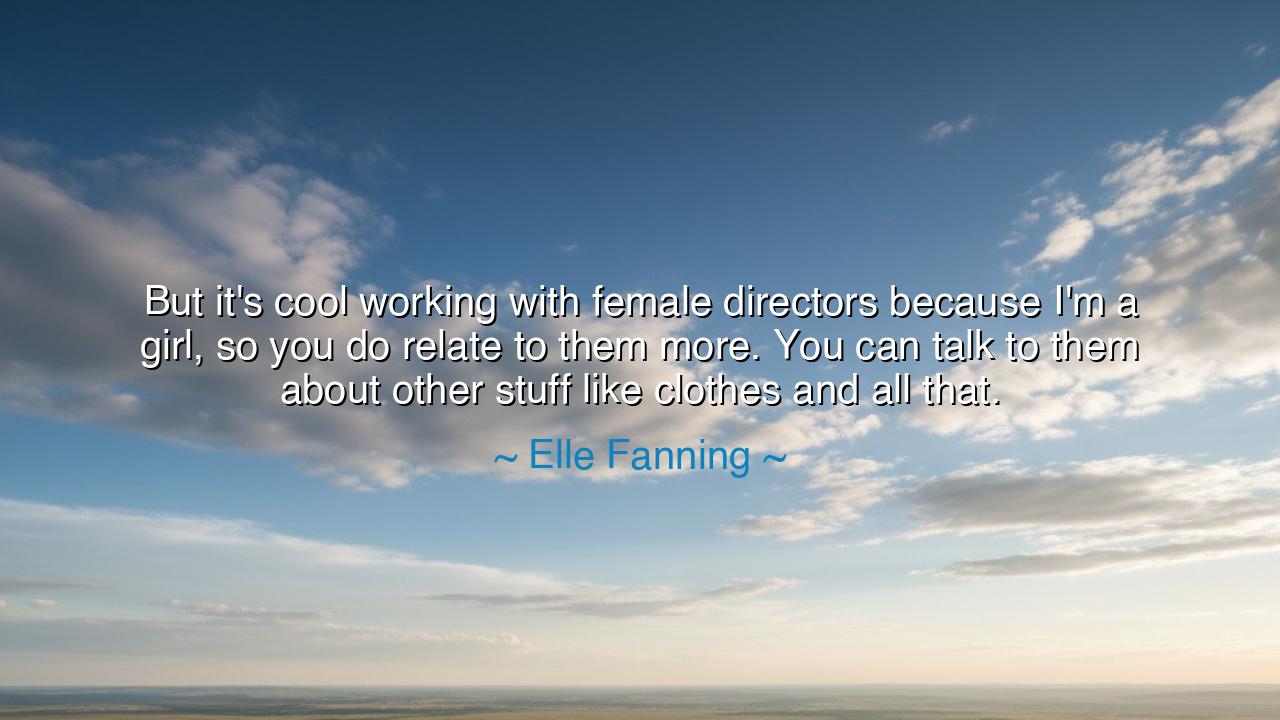
But it's cool working with female directors because I'm a girl
But it's cool working with female directors because I'm a girl, so you do relate to them more. You can talk to them about other stuff like clothes and all that.






In the journey of life, there are moments when the connection between individuals, shaped by shared experiences and identities, creates a bond that is both profound and meaningful. Elle Fanning’s words, "But it's cool working with female directors because I'm a girl, so you do relate to them more. You can talk to them about other stuff like clothes and all that," reflect the unique understanding that arises when people share a common identity. In this case, the shared identity of womanhood creates a space where conversations are not limited to professional work alone but extend into personal and cultural experiences that foster relatability and connection. This dynamic reveals the deep importance of shared experiences in creating stronger, more cohesive relationships in both personal and professional life.
In the ancient world, such connections between individuals of the same gender or class were not only natural but essential to the social fabric. In Athenian society, the role of women was often confined to the household, but within that space, a network of shared experiences and understandings existed. The women of Athens might have gathered to share stories, advice, and even personal struggles, creating a sense of camaraderie and solidarity that transcended the societal limitations placed upon them. Similarly, Homer's Iliad and Odyssey describe moments where bonds formed between characters based on shared experience—whether in battle or in fellowship—and these connections gave strength to the journey of the hero. Just as these ancient ties were a source of power, so too can modern connections, especially those forged by shared identity, empower us.
Fanning’s recognition of the value in working with female directors also speaks to a greater truth: the power of representation and the importance of having role models who reflect one's own identity. In the ancient world, this truth was embodied by figures like Artemis, the goddess of the hunt, protector of women, and a symbol of female empowerment. Women, like Artemis, were capable of great deeds and accomplishments, but their true strength often came from the community and relationships they built with one another. Just as Artemis shared a unique bond with the women she protected, Fanning's connection with female directors exemplifies how shared gender identity can create a foundation for trust and mutual respect—an understanding that may be more difficult to find in spaces where one's identity is marginalized.
In modern history, we also see the significance of shared identity in powerful moments of change. The rise of female filmmakers like Kathryn Bigelow, Ava DuVernay, and Greta Gerwig has brought to light the importance of representation and the connections that are made possible when women are given the tools to lead and create. Fanning’s comment reflects the cultural shift that has been unfolding over recent decades—women, particularly in the arts, are not just working together, but are building networks of support that transcend traditional professional barriers. This camaraderie allows for deeper collaboration, where conversations can flow beyond the technical aspects of work and into the more personal, relatable realms of shared experience, such as the joys and challenges of being a woman in a predominantly male-dominated industry.
The lesson here is clear: when people come together with a shared identity—whether it be gender, culture, or experience—the potential for deeper, more meaningful connections increases. These connections foster a sense of solidarity and support that allows individuals to thrive in their personal and professional lives. As Fanning illustrates, working with those who share a common background or perspective brings about a deeper sense of understanding, creating a foundation upon which greater collaboration can flourish. The ability to connect on a personal level opens the door to greater professional success, as it builds trust, communication, and empathy.
In practical terms, we must value and nurture the relationships we share with those who are like us, but also be open to the richness of diversity. While shared identity can deepen connection, it is also important to recognize the strength in connecting with those who may not share the same background. As we create more inclusive spaces, both in our personal lives and professional environments, we should remember that the key is not simply to relate to those who are like us but to embrace the power of unity in diversity. Whether we are male or female, from different cultures or different walks of life, we must work to foster spaces of mutual understanding, where people can build on their shared experiences and grow together.
Just as Fanning finds strength in her connection with female directors, so too can we find the power of connection in our own lives by nurturing relationships that go beyond the surface. Embrace those who share your journey and empower each other to reach greater heights. Build networks of trust, where open, meaningful dialogue is not limited to work alone but expands into the more personal, human aspects of life. In doing so, we elevate one another and move toward a future where every voice, every person, can thrive.






AAdministratorAdministrator
Welcome, honored guests. Please leave a comment, we will respond soon